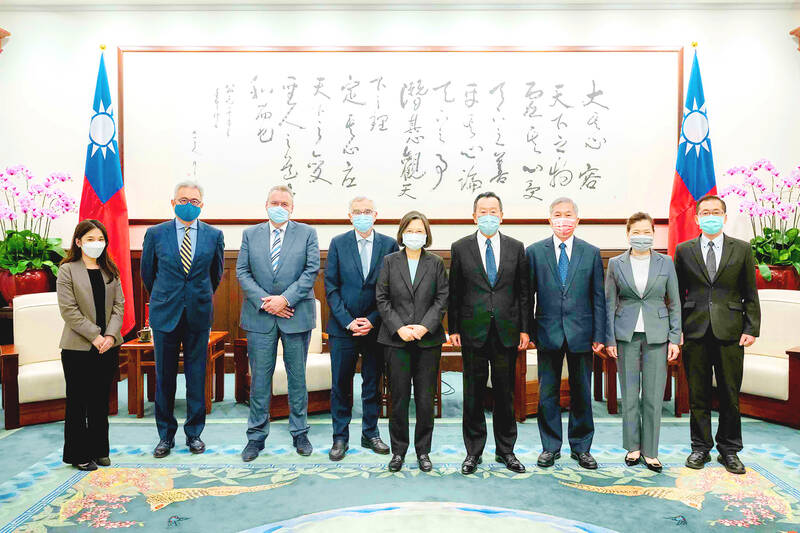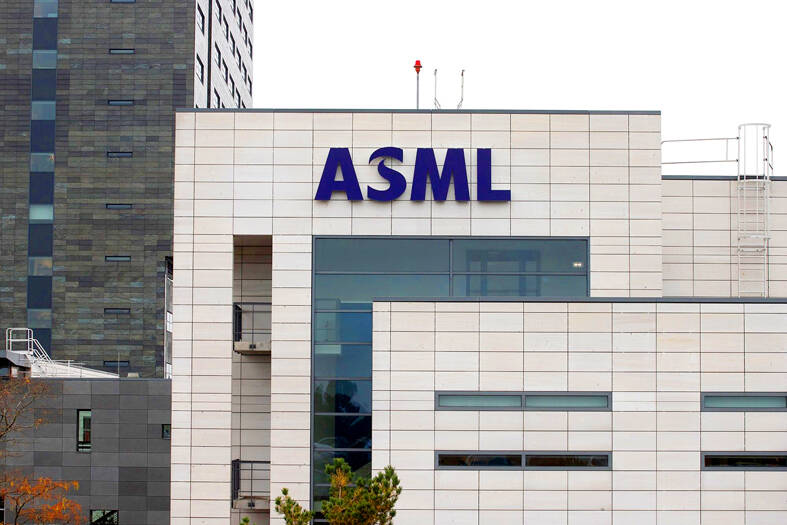Netherlands-based ASML Holding NV, a leading global supplier of chipmaking machinery, on Wednesday announced plans for a factory in New Taipei City to support international customers and the development of the semiconductor industry.
ASML’s announcement came after President Tsai Ing-wen (蔡英文) praised the company’s commitment to continuously investing in Taiwan at a meeting on Tuesday with its chief operations officer, Frederic Schneider-Maunoury.
ASML continues to invest globally and in Taiwan to prepare for the company’s continued growth, and to support global customers and the development of the semiconductor industry, the company said in an e-mail reply to Taiwanese media.

Photo courtesy of the Presidential Office via CNA
Vice Premier Shen Jong-chin (沈榮津), who was at Tuesday’s meeting, said that ASML should begin construction on the New Taipei City project in July next year.
ASML is the world’s sole supplier of extreme ultraviolet lithography (EUV) photolithography machines used by semiconductor manufacturers to produce cutting-edge chips.
It has become one of the foremost wafer-foundry equipment suppliers to Taiwanese manufacturers, including Taiwan Semiconductor Manufacturing Co (台積電), the world’s largest contract chipmaker.

Photographer: Peter Boer/Bloomberg
At Tuesday’s meeting, Tsai told Schneider-Maunoury that investing in Taiwan was “a very correct direction” and that the government would continue to provide support, a press release issued by the Presidential Office said.
ASML has five factories in Taiwan employing more than 4,500 people and plans to increase its investments in the country, the release said.
The company in 2020 launched a global EUV training center for engineers at the Southern Taiwan Science Park (南部科學園區) in Tainan.
ASML’s new project next year would be its biggest investment in Taiwan yet, and the continued cooperation between the company and Taiwan will enhance each other’s semiconductor capabilities, Tsai said in a social media post later on Tuesday.
Tsai said she was grateful that ASML had taken concrete actions to invest at a time when the world is focusing on Taiwan.
“I believe this would dispel the over-hyped risk of investing in Taiwan,” she said.
The company’s teams are based in Hsinchu City, New Taipei City’s Linkou District (林口), Taichung and Tainan, with its first office dating to 2003, ASML’s Web site says.
ASML is aggressively expanding its presence in Asia to enhance collaborations with its largest customers, aiming for significant growth opportunities.
On Wednesday, the company held a groundbreaking ceremony of its new semiconductor cluster in South Korea, home to the world’s two biggest memorychip makers: Samsung Electronics Co and SK Hynix Inc, Yonhap news agency reported.
ASML is building a US$181 million chip cluster in Hwaseong, about 40km south of Seoul, which would include a local repair center, training center, research and development center for parts, and education and experience center, the report said.
The construction is expected to be completed by the end of 2024, it said.
South Korea accounted for 33.4 percent of ASML’s total sales last year, up from 29.7 percent the previous year, company data showed.

NEW IDENTITY: Known for its software, India has expanded into hardware, with its semiconductor industry growing from US$38bn in 2023 to US$45bn to US$50bn India on Saturday inaugurated its first semiconductor assembly and test facility, a milestone in the government’s push to reduce dependence on foreign chipmakers and stake a claim in a sector dominated by China. Indian Prime Minister Narendra Modi opened US firm Micron Technology Inc’s semiconductor assembly, test and packaging unit in his home state of Gujarat, hailing the “dawn of a new era” for India’s technology ambitions. “When young Indians look back in the future, they will see this decade as the turning point in our tech future,” Modi told the event, which was broadcast on his YouTube channel. The plant would convert

‘SEISMIC SHIFT’: The researcher forecast there would be about 1.1 billion mobile shipments this year, down from 1.26 billion the prior year and erasing years of gains The global smartphone market is expected to contract 12.9 percent this year due to the unprecedented memorychip shortage, marking “a crisis like no other,” researcher International Data Corp (IDC) said. The new forecast, a dramatic revision down from earlier estimates, gives the latest accounting of the ongoing memory crunch that is affecting every corner of the electronics industry. The demand for advanced memory to power artificial intelligence (AI) tasks has drained global supply until well into next year and jeopardizes the business model of many smartphone makers. IDC forecast about 1.1 billion mobile shipments this year, down from 1.26 billion the prior

People stand in a Pokemon store in Tokyo on Thursday. One of the world highest-grossing franchises is celebrated its 30th anniversary yesterday.

Zimbabwe’s ban on raw lithium exports is forcing Chinese miners to rethink their strategy, speeding up plans to process the metal locally instead of shipping it to China’s vast rechargeable battery industry. The country is Africa’s largest lithium producer and has one of the world’s largest reserves, according to the US Geological Survey (USGS). Zimbabwe already banned the export of lithium ore in 2022 and last year announced it would halt exports of lithium concentrates from January next year. However, on Wednesday it imposed the ban with immediate effect, leaving unclear what the lithium mining sector would do in the